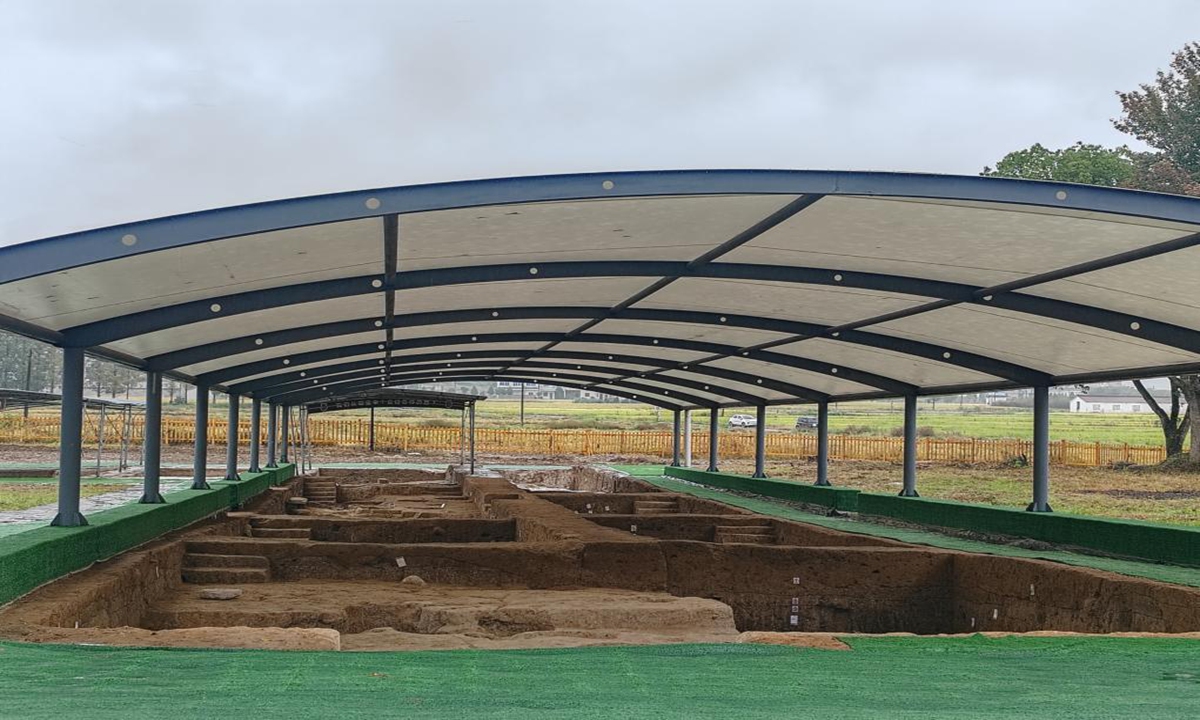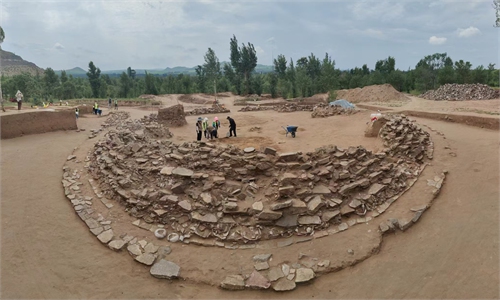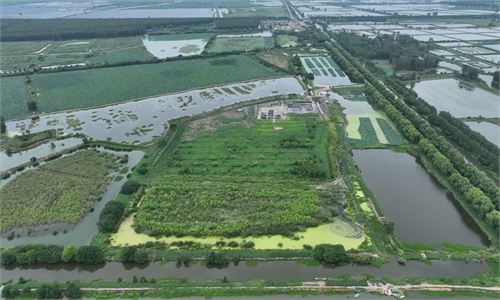ARTS / CULTURE & LEISURE
New Shangshan culture discovery of rice site may reveal earlier inequality in human society

Ditches discovered at the Xiatang relic site in Xianju County, East China's Zhejiang Province. Photo: Xinhua
Ceramic artifacts discovered at the Xiatang relic site in Xianju county, East China's Zhejiang Province have shed light on human social structures, with clues that may trace earlier social inequality back nearly to 9,500 years.
From Friday to Sunday, over 120 Chinese researchers and archaeologists gathered in Xianju for a conference to mark the 40th anniversary of the Xiatang relic site's discovery, as reported by People's Daily.
Qin Ling, an associate professor at Peking University, told the Global Times on Monday that the Xiatang relic site, as part of the Shangshan culture recognized as the origin of global rice cultivation and a foundation of China's agrarian village culture, is advancing the joint application for World Heritage status for six sites.
"This conference aimed to define the archaeological value of the Xiatang relic site and assess the heritage significance of Shangshan culture," Qin said.
Notably, the large tombs discovered at Xiatang may raise key questions on early social inequality. Qin remarked on the unexpected high-status burials, suggesting the possible existence of a social hierarchy within the community. This finding indicates that social stratification might have been present much earlier than previously thought, broadening our understanding of Shangshan culture, People's Daily reported.
"The different status of burials in different relic sites in China at the Neolithic period are speculated to show the complexity and uniqueness of the society at the time, if further burial pits of varying sizes are uncovered at the same site, they could offer deeper insights into the early social inequalities of human society," Qin said.
According to Xinhua News Agency, the Xiatang relic site was first discovered in 1984, covering an area of 30,000 square meters with cultural deposits up to 2.5 meters thick. It has become a critical marker in the archaeological study of Neolithic southern Zhejiang.
Located at the southernmost point of the Shangshan cultural area, Xiatang is considered one of East Asia's most significant early Neolithic settlements and is believed to be among the oldest centers of rice agriculture.
Archaeologists discovered two concentric ditches at the site. The inner ditch dates to the Shangshan and Kuahuqiao cultural periods, approximately 7,000 to 10,000 years ago, while the outer ditch belongs to the Haochuan period, about 4,000 to 4,500 years ago. Excavations within the ditches unearthed more than 10 artificial mounds from the Shangshan era, where pits filled with pottery have been found. Ancient rice paddies from the Haochuan cultural period were also uncovered on the outskirts of the settlement.
The discoveries at Xiatang go beyond mere artifacts. Zhong Zhaobing, a research fellow at Zhejiang Institute of Antiquities and Archaeology, noted that the discovery includes four building remains, an agricultural processing site, and numerous tombs. Among these, a high-status burial site with over 20 burial potteries has emerged as the largest and most elaborate tomb discovered in Shangshan culture to date.
"Xiatang is the most structurally complete and complex settlement of Shangshan culture that we have unearthed so far," Zhong said, as reported by Xinhua.
One of the site's key revelations is the early agricultural practices it reveals. Zhao Hui, a senior professor at Peking University, said that evidence increasingly points to rice agriculture as the foundation of this society, highlighting the contrast between northern China's dry farming and the south's focus on rice. Xiatang serves as a crucial link to the origins of rice agriculture.
With only about 2,250 square meters excavated, Xiatang still holds many undiscovered secrets. Zhao emphasized the need to balance further excavation with careful preservation.
"While advancing our archaeological work, we must also strengthen efforts to preserve this historical and cultural heritage. Issues beyond our current capacity can be left for future generations to address," Zhao said, as reported by People's Daily.



